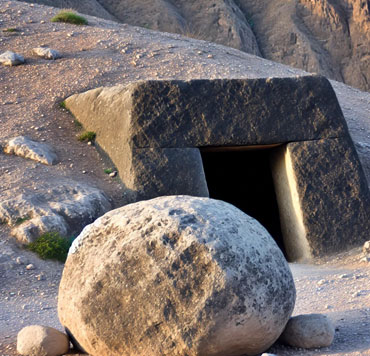
Jesus Christ lived 2,000 years ago, not far from Jerusalem. In this Middle Eastern culture women were often treated as property. Their only purpose was to serve their husband and children.
Jewish rabbis began every temple meeting with the words, "Blessed art thou, O Lord, for thou has not made me a woman."
A wife was never allowed to divorce her husband. However, a husband could divorce his wife for any reason, and he had no obligation to financially care for her. The husband simply handed her a bill of divorce and sent her away.
Further, women were excluded from the Jewish synagogue and were rarely taught the Torah, even in private.
He performed miracles as readily for women, as for men. He also taught both men and women. It didn’t matter to Jesus what their religious credentials were, or their social standing, or their lifestyle.
He loved people and interacted with them in a very welcoming way, men and women alike. He befriended thieves, prostitutes, lepers, and the poor.
Author Philip Yancey comments, "For women and other oppressed people, Jesus turned upside down the accepted wisdom of his day. According to biblical scholar Walter Wink, Jesus violated the mores of his time in every single encounter with women recorded in the four Gospels."1
Thousands of people followed Jesus. Some people came for his teachings, but most did so because of the miracles he was doing among them, healing their sick.
The religious leaders grew increasingly jealous over Jesus’ popularity. Crowds were drawn to Jesus and the religious elite had to put a stop to it. And so they came up with a plan to trap Jesus in a no-win situation.
 Their law required stoning to death any woman caught in adultery. (Never the man, always the woman.) They captured such a woman, likely a prostitute, and violently dragged her before Jesus. There she crouched alone, exposed, waiting. The crowd surrounding her was well equipped, heavy stones in hand, just waiting for the signal to throw them.
Their law required stoning to death any woman caught in adultery. (Never the man, always the woman.) They captured such a woman, likely a prostitute, and violently dragged her before Jesus. There she crouched alone, exposed, waiting. The crowd surrounding her was well equipped, heavy stones in hand, just waiting for the signal to throw them.
Everyone had heard Jesus teach about love and kindness, the need to forgive one another.
The religious instigators of this mob loudly announced to Jesus and the crowd, "Teacher, this woman was caught in the act of adultery. In the Law, Moses commanded us to stone such women. Now what do you say?"
If he called for mercy for her, they would accuse him of accepting adultery and being an enemy of their moral law. If Jesus agreed with stoning her, then all his teaching about the need for compassion and forgiveness was negated. Does Jesus go along with the stoning or not?
Jesus bent down and started to write on the ground with his finger. They continued to press him. Jesus straightened up and said to them, "If any one of you is without sin, let him be the first to throw a stone at her." Again he stooped down and wrote on the ground.
One by one they dropped their stones and walked away, "beginning with the oldest" until it was only Jesus left with the woman. Jesus asked her,
 "Woman, where are they? Has no one condemned you?"
"Woman, where are they? Has no one condemned you?"
"No one, sir," she said.
"Neither do I condemn you," Jesus declared. "Go and sin no more."2
Can you imagine how stunned she was? She gets to live. And she’s free to go.
Jesus knew that one day soon, on a cross, he would be paying the penalty for her adultery, for the crowd’s hatred, and for the religious leaders’ callous arrogance. The sins of the whole world would fall on him, as he gained our forgiveness.
Though he was God, the only one with the right to judge her, he was able to honestly tell this woman, “Neither do I condemn you. Go and sin no more.”
Jesus said he did not come to judge, but came to seek and to save the lost. He is our Savior. He changes the lives of those who know him.
Here is another example.
Jesus was resting by a well where the entire community would come to draw their water. It was the hottest part of the day, a time when no one came. But a woman showed up, hoping to not see anyone or be seen.
You see, she was a Samaritan, which was an ethnic background considered inferior by the Jews.
Not only that, but she had been married and divorced five times, now living with a sixth man. She likely was viewed with complete disdain by people in her village. So she came to get water when no one would be there.
However, Jesus was at the well when she arrived.
Jesus knew all this about her and wanted to help her.
 Jesus said to her, “Everyone who drinks of this water will be thirsty again, but whoever drinks of the water that I will give, will never be thirsty again. The water that I will give will become in him [her] a spring of water welling up to eternal life.”3
Jesus said to her, “Everyone who drinks of this water will be thirsty again, but whoever drinks of the water that I will give, will never be thirsty again. The water that I will give will become in him [her] a spring of water welling up to eternal life.”3
She had many questions, all of which Jesus answered. By the end of their conversation she realized that Jesus was the Messiah, the Savior of the world, that both the Samaritans and the Jews were waiting for. She ran back to her village and persuaded her entire village to come hear Jesus … which they did! Jesus changed her life of shame into joy. In every encounter with women, he changed their lives.
Here is perhaps the most amazing example of how Jesus valued women.
Before Jesus was killed by crucifixion on a cross, many times he told his followers, which included women, that he would come back to life three days after his burial.
Jesus was in fact arrested, tortured by the Roman government, who then nailed his body to a cross where he hung until death.
Jesus’ body was taken down from the cross, wrapped in linen cloths and ointments as was the custom, and placed in a tomb with a large boulder sealing the entrance.
The Roman government also placed a guard of soldiers at Jesus’ tomb, because everyone knew that Jesus said he would rise from the dead.
On the third day, several women who loved Jesus went to the tomb, which was customary to honor the deceased.
When they got there, the soldiers were gone and the boulder sealing the tomb was some distance away, with an angel sitting on top of it!
The angel said to the women, “Don’t be afraid. I know you are looking for Jesus, who was crucified. He isn’t here! He is risen from the dead, just as he said would happen. Come, see where his body was lying.”4
 Then, against all Jewish culture, the angel entrusted to women the most important message ever delivered.
Then, against all Jewish culture, the angel entrusted to women the most important message ever delivered.
The angel continued, “And now, go quickly and tell his disciples that he has risen from the dead, and he is going ahead of you to Galilee. You will see him there.”5
Women had no standing in Jewish culture. They couldn’t testify in a court of law. They had no authority. Yet it was to women that God entrusted the message of Jesus’ resurrection.
The women ran quickly, “very frightened but also filled with great joy.”6
When they reached the disciples, John and Peter, two of Jesus’ closest friends ran to the tomb to see it for themselves.
Over many days, Jesus appeared to many, confirming his resurrection.
Yet, it was to a woman, Mary Magdalene, that Jesus first appeared, again showing how he equally valued women.
Jesus loves all people, no matter who they are or what they've done. He wants you to also know and experience his love for you.
Jesus explained his purpose, "I came that you might have life, and have it more abundantly."7
See what he offers you for your life. Please see this article showing you how you can begin a personal relationship with Jesus: Beyond Blind Faith.
| ► | How to know God... |
| ► | I have a question or comment... |
Footnotes: (1) Philip Yancey; The Jesus I Never Knew, pg 154, Zondervan Publishing House. (2) John 8:4-11 (3) John 4:13,14 (4) Matt 28:5-6 (5) Matt 28:7 (6) Matt 28:8 (7) John 10:10
Other articles/videos you might be interested in…